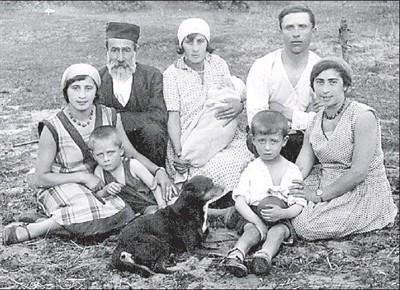Remembering my murdered brothers
The following article by Bernie M. Farber, former CEO of CJC and
CJC Charities Committee, appeared as an op-ed in the National
Post on Yom haShoah ve haGvurah, Holocaust Remembrance and
Heroism Day, May 2, 2011.

Farber, the author's father, is at the back right in this
photo from the 1930s. From left: Malka, the author's aunt, with
Yitzhak; Mordechai Farber, an unidentified woman with baby, Shalom
(with ball), Max, and his wife, Zisela, mother of the
boys.
Today at sunset, as Yom
HaShoah (Holocaust Memorial Day) concludes, thousands of Canadians
will have participated in commemorations that represent a precious
opportunity for reflection, meditation and mourning -both public
and private. It also presents an important challenge to us all to
fulfill the obligation of remembrance.
As it always is at this time
of year, my heart is full with the stories my father Max told me of
his experiences during the war. He was one of two Jewish survivors
of Botchki, a small Polish town whose Jewish inhabitants were
transported by rail to Treblinka, and to oblivion. Included in that
transport was my father's first family, including two young
half-brothers I would never know -Yitzchak and Sholom.
It is important to replace
numbers with names, which is why I feel the need to name my lost
brothers. Each victim of the Holocaust had a name, felt love, was
loved, laughed, cried and ultimately was murdered by the Nazi
hordes. This lack of names is like a deafening silence -the silence
of a murdered generation, including 1.5 million Jewish
children.
German philosopher Friedrich
Nietsche once observed that one needs to be careful when staring
into the abyss, because sometimes the abyss would stare back. The
Holocaust is the triumph of nothingness. We perhaps cannot realize
today how nearly complete that triumph was.
In 1993, at a chance meeting
in Arolsen, Germany with the director of the international
headquarters of the Red Cross, I learned details of the fate of my
father's family. I found my father's Displaced Persons Camp file
that contained bits and pieces of information I never knew before.
A few years later, I was overwhelmed to find a book on my father's
village written by a former Jewish inhabitant who left Poland years
before the Holocaust began. The postscript to the book, written by
the author's daughter, after his death and just prior to
publication, reads as follows:
"Wellie Farber . and one
companion jumped off a transport train on the way to Treblinka and
hid in the forests for the remainder of the war after which he
obtained a visa for Venezuela, together with a brief transit visa
for the United States. While there, he managed to locate my father
in Washington and told him of the fate of the Botchki Jews. All had
been transported to Treblinka on Nov. 2, 1943. So far as he knew
all had gone immediately to the gas chambers. There were no other
survivors."
Wellie Farber was my father's
nephew. The two were the only Jewish survivors of the Botchki
ghetto. When my father found him years after the war, living in
France, he was no longer the man he used to be. Wellie lost much of
his memory of that horrible time and was never able to tell my
father his story of survival after they lost each other in the
woods of the Bielski forest.
It is too late for the
murdered Jews of Europe. The world had its opportunity to save them
and did too little, too late. The deeds of those Christians who
protected Jews from persecution, the righteous among the nations,
represent a flickering spark of humanity in a world that had gone
dark. They offer a sharp rebuke to those who say "we had no
choice," or "we did not know," or "it was not our
business."
No words can bring meaning or
sense to the Shoah (the Hebrew term for the Holocaust). But
commemoration can bring hope to those who survived and those who
remember. And in so doing, we can at least show the victims of the
Nazi madness that their deaths had some effect on us, caused us to
reflect, reconsider and even hope. We must honour those who were
lost with forthright action and a commitment to ensure that never
again will the demons of the human spirit gain ascendancy -never
again will we turn a blind eye to the torment of others.
Many survivors, like my dear
father, found a haven in Canada. They were and are the true heroes
of this sad epoch in history. Through their courage, they found the
strength to start over again; to build new families and to leave a
legacy of hope, love and determination for their children and their
descendants to follow.
In the end, we must show a
fidelity to history and memory. We do this for ourselves and for
those whose echoes were so murderously silenced -for the Yitzhaks
and Shaloms -whose still, small voices call out from the grave to
all of us to remember.
- Bernie M. Farber, CEO of
Canadian Jewish Congress, is the son of Holocaust survivor Max
Farber.
Back to cjccc.ca
In the News